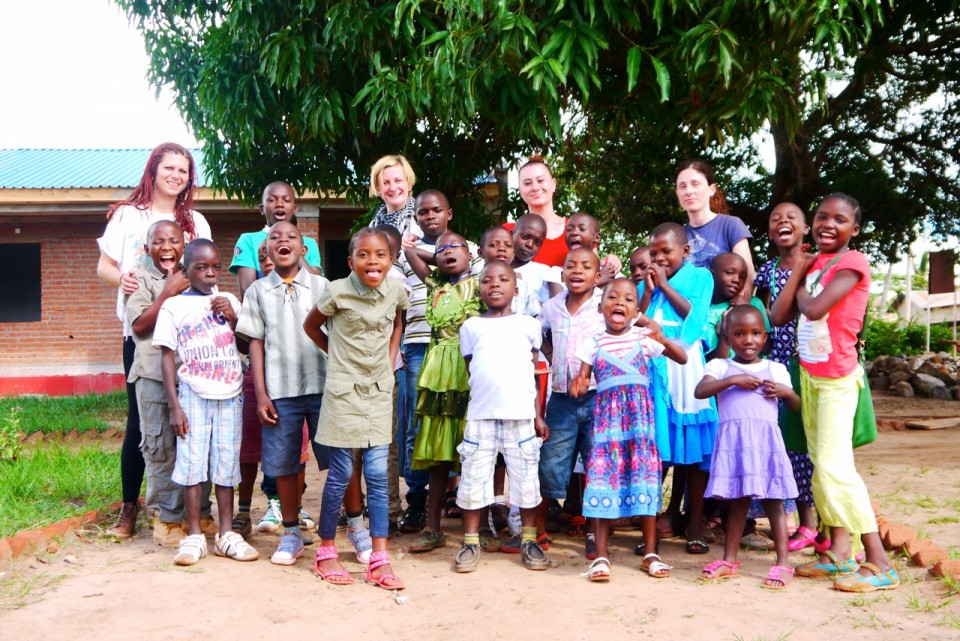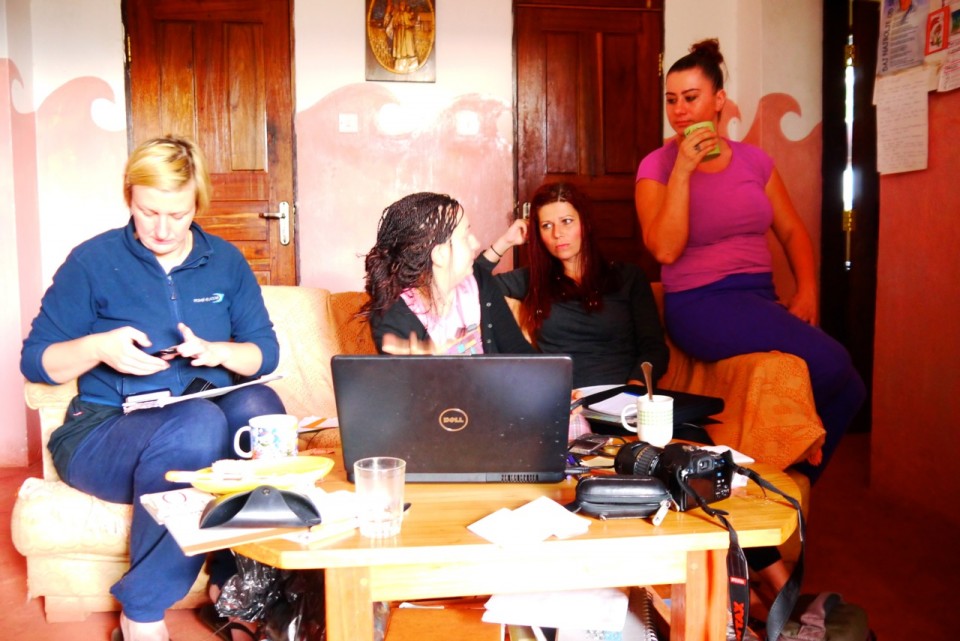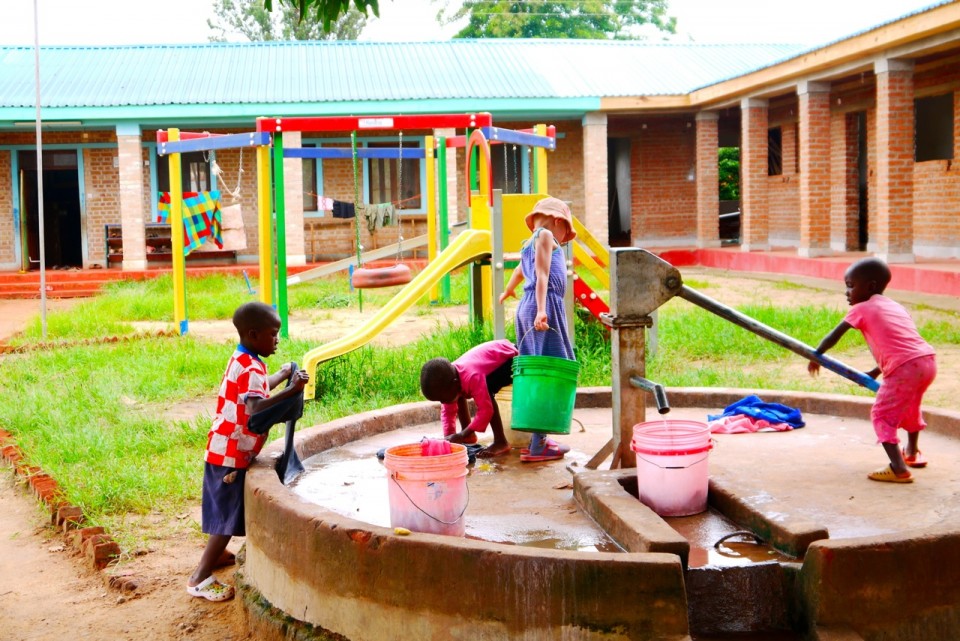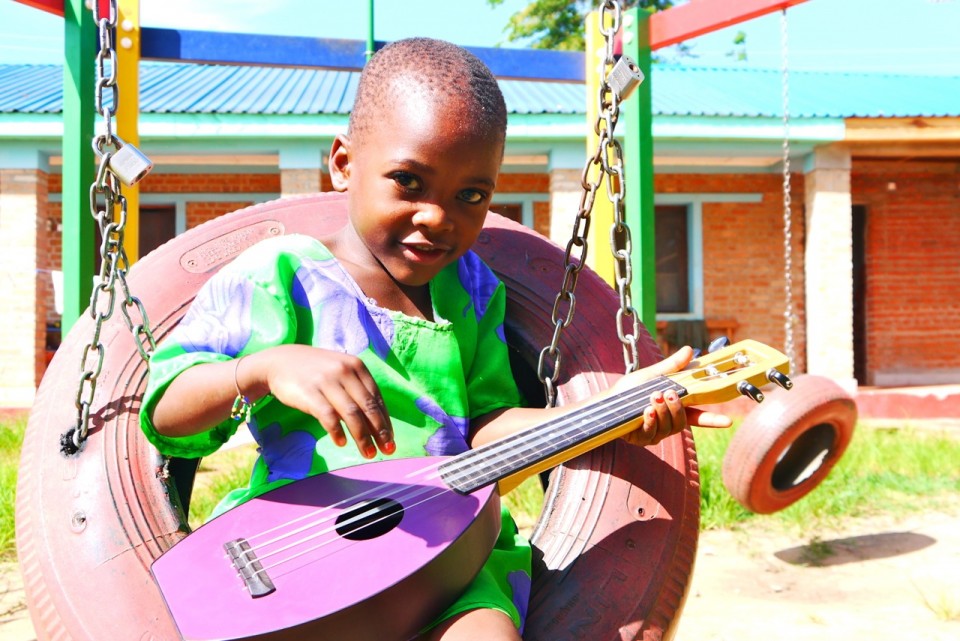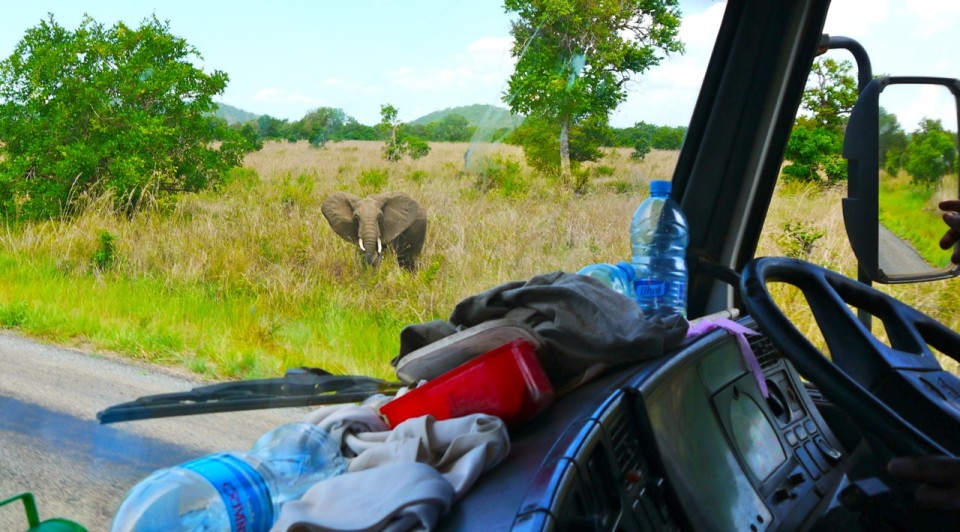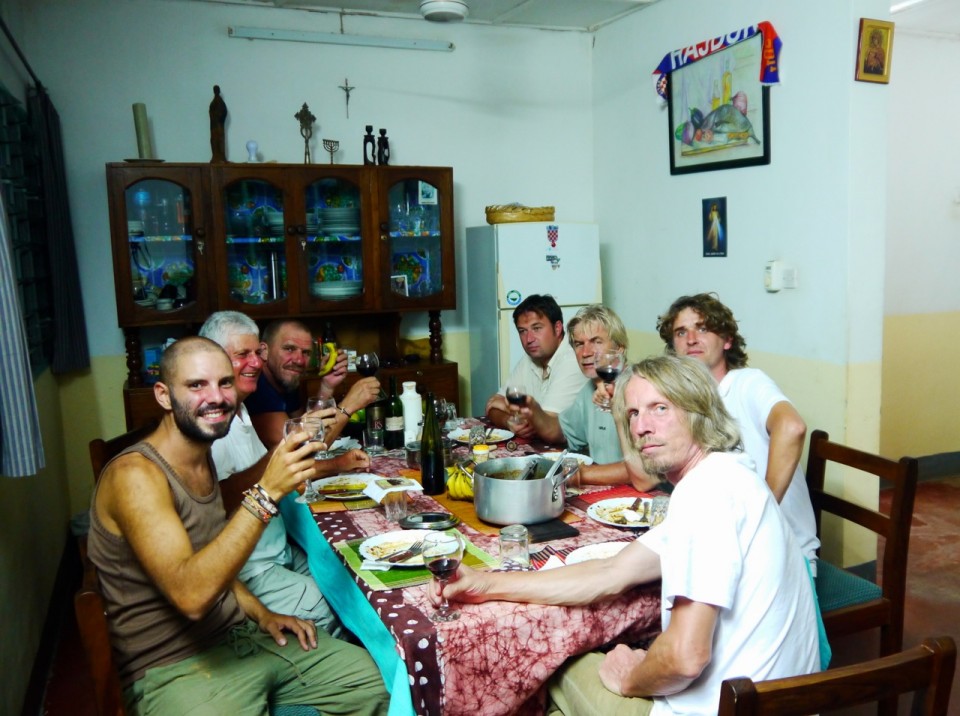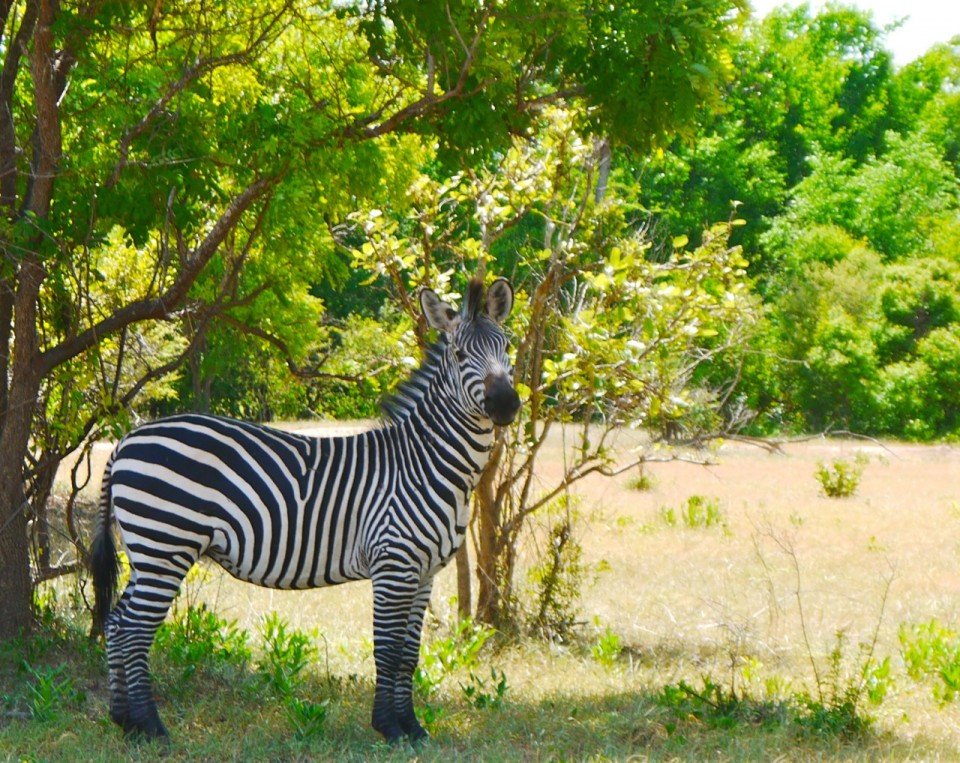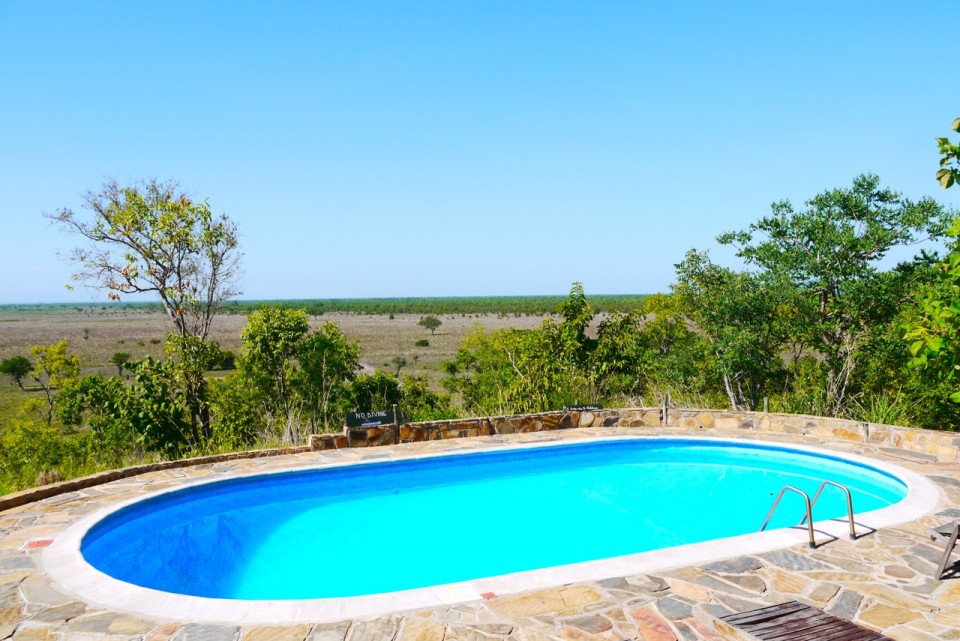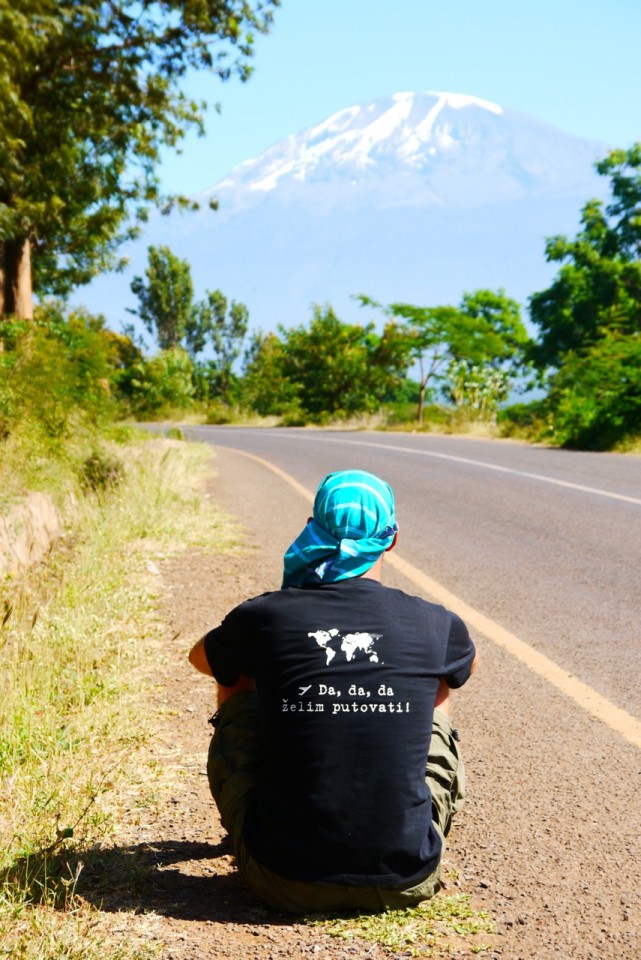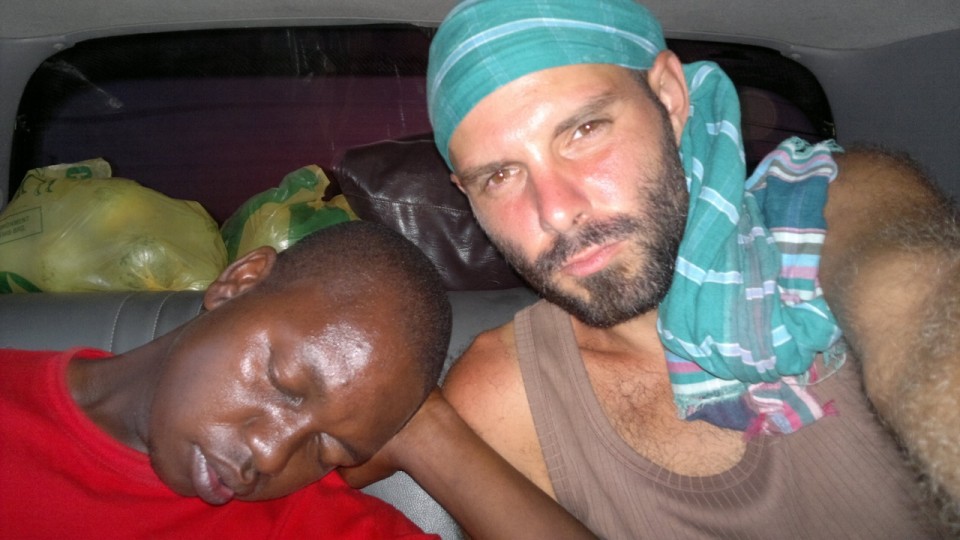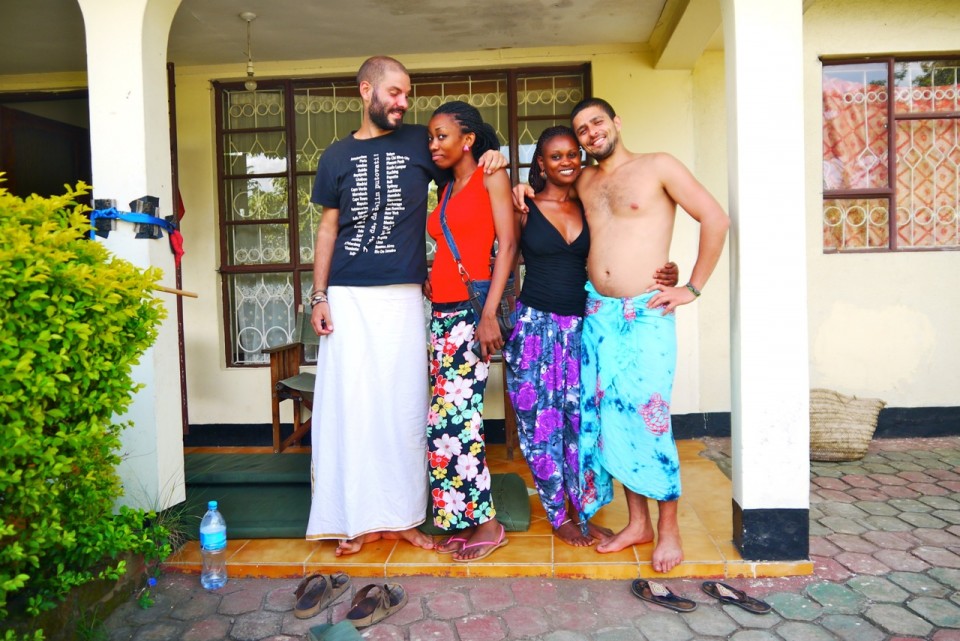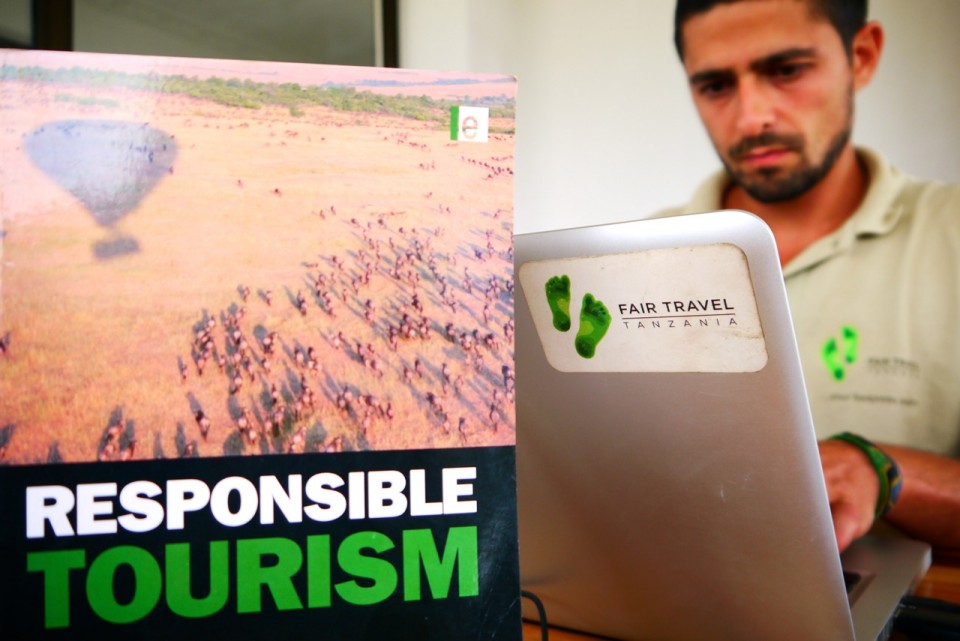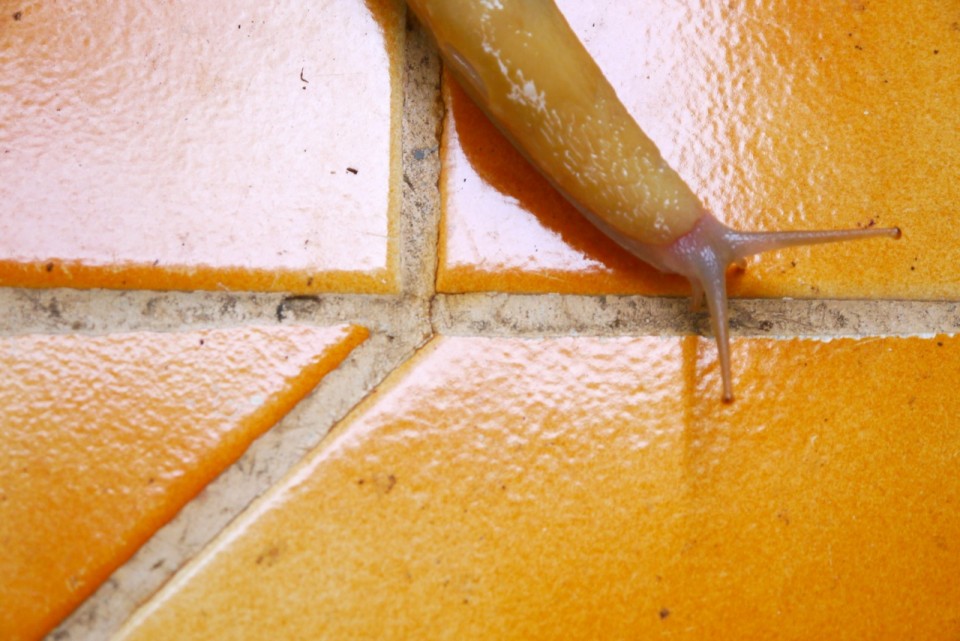Mbamba Bay, the shore of Lake Nyasa (that was its name in Tanzania, although its name in Malawi was – Lake Malawi), 9 p.m., pitch dark. All the smugglers were hastily putting the bags of sugar in the truck. In the meantime, I was patiently waiting for someone to inform me if there was a slightest possibility of me getting a Tanzanian visa in this small place with no sign of civilization. When the sugar was finally loaded, one of the locals took me by the hand and without saying a single word (I noticed straight away that Tanzanians didn’t speak much English) and took me for a walk through the village lit up by candles and lamps. Even in those moments with barely any lights I was still easy to spot – I was glowing in the dark!
After a half-hour walk we come in front of a big house, and we knock on the door. A guy in a pyjamas comes out, shouts at my friend on dangerous Swahili language, but at the end opens the door and lets us into his home/office. I came to the house of a custom officer. One candle in his office, just enough he can check my passport, take money for a visa, glues it on one of the remaining pages, and tries to cheat me for ten thousand schillings. Expected.
I spent the night in a small room for a couple of kunas, and the moment the sun was up I was in a bus that led me to Songea through green valleys. What was the reason for my visiting an unknown place in the south of Tanzania? I wanted to visit the orphanage of Saint Anthony. It had been built a couple of years before, mostly with the help of the donations from the people from Croatia and with the help of the association Kolajna ljubavi (“The necklace of love”). The very same association had been running a programme of “godfathering” where people could donate money for education of a child and in that way sponsor him or her.
You could really feel at home in the orphanage: during the couple of days I was there I met seven Croatians volunteers. In that way, the number of Croatians I’d met on my journey doubled up in one place.
The volunteers took care of twenty-something children: all of them were orphans or their parents simply couldn’t take care of them anymore. Despite everything, they always smiled, they were clever and obedient. Almost all of them were fluent in English, even though some of them had been in the orphanage only for a couple of months. They did their own laundry, climbed on the tall mango trees to pick up the fruits, did the garden work and repaired broken things. They were more independent than I had ever been.
A man would grow fond of those kinds in an instant in that surrounding. While talking to other volunteers and some of them were for the second or the third time there, I realized that once you let those kids grow under you skin there was no going back. So, I decided not to get too attached to them, as far as possible. However, no matter how hard you tried to hold back when a cute little kid comes to you with a bandage to put it on her elbow or when another beautiful kid throws herself in yours arms with no reason, when a gorgeous little girl sits in your lap and you play ukulele and sing together, then you can’t do anything about it. So, you end up e-mailing Ivana, the director of the orphanage, asking about the possibilities of an adoption and when she tells you that such a thing isn’t possible you can only do one thing, except the possibility of kidnapping a child: take your backpack and leave the very next morning. And I did exactly the same thing.
—
YT VIDEO – TANZANIA (1):
—
My next stop was Iringa, a small town where I had a CS host and which was on my way to the North. In Iringa I played touch-rugby; a Mexican lady taught me how to prepare enchiladas; spent quite some time in a café/restaurant who hired deaf-mute people and in that very place, in the morning of my 496th day of travelling, I made a decision that I was – coming back home.
Like most of my important life decisions I made that one quickly without thinking about it too much. All I felt was some strange sensation in my stomach that was telling me it was time.
I didn’t feel like travelling anymore. I didn’t feel like discovering new places. I didn’t want to get to know new people only at the surface. I didn’t feel like staying in Africa where I was a complete stranger. I didn’t have any energy left; any motivation, any strength.
Was there something that was making me continue with my travelling? If we put aside the fact that I named my journey 1000 days of summer, there wasn’t any other reason, but my ego; the ego which would consider my premature return back home a failure. I was trapped in my own freedom. The whole philosophy of my journey came down to one thing – being free; have a possibility of choice in every moment; not follow others; not listen to what other people say. If I was to play by my own rules, the person who had been planning to travel for 1000 days wasn’t there anymore. I was somebody else so I didn’t have to listen to that old me.
I’d been across four continents. I’d sailed across Indian Ocean. I’d come across a couple of places that I could call home. I’d beaten my fears. I’d met incredible people. I’d learnt more than in eight years in the university. I’d tasted food and drinks I hadn’t even known there existed. I’d put my mind and heart in order.
What was left for me to do: travel the rest of Africa; sail across another ocean; hitchhike a plane; travel both Americas; become fluent in Spanish; discover other magical places; meet more kind people? All these things somehow seemed useless. They didn’t represent a challenge. I had nothing to prove anymore – either to myself or to the others.
Either way, I was soon to be left with no empty pages in my passport.
And so, in the middle of my journey, I decided to come back. However, I still had some time. I was meeting my dad in Kenya in a month so after our meeting I was to decide how to get home, that is, whether to hitchhike across Ethiopia, Sudan and Egypt or, simply, fly directly to Croatia. In the meantime, I told myself to enjoy the remaining time in Africa.
In the morning of my 500th day I woke up, to find a card from Tiffany, one of my hosts, congratulating me for my 500 days spent on road after which I got out and stuck out my thumb. Destination – Dakawa, a small town in the middle of Tanzania where a couple of Croatian missionaries/priests were expecting me. That could be useful as a preparation for my return to homeland.
My ride to Dakawa was the first genuinely African one – I hitchhiked a truck with three guys sitting in the front seat and since the road led us through Mikumi national park I saw a lot of elephants, zebras, giraffes, monkeys and antelopes just a few meters from the road. The driver was so good that he would kindly pull over so that I could easily take a few photos of those beautiful creatures that were ready to pose, obviously already accustomed to the attention.
In Dakawa I was welcomed by six Croatians – missionaries, priests, sculptors…all of them on a special African mission. They welcomed me as if I were their old friend – with beer, wine, homemade cow cheese, sudžuk (a Croatian sausage) and a bit later we had delicious dinner instead of a cake for the day number 500.
In order to celebrate my 501th day of travelling we went to Mikumi national park following the road I’d taken the day before. That time we used a SUV to get inside the park and managed to see all kinds of animals from even smaller distance: elephants, crocodiles, hippopotamuses, giraffes etc. They didn’t seem wild given that humans were their everyday sight.
We also visited a restaurant in the middle of wilderness that had a pool which was pretty much a big contrast: a pool in the middle of that wilderness.
My next destination was Moshi, a small town at the foot of the tallest mountain in Africa – Kilimanjaro.
I spent a few days there in the company of a couch surfer from Peru and a bunch of his friends. We played football, softball, prepared a barbecue, had some beer. I noticed an interesting coincidence (or was it really a coincidence?) – none of the couch surfers I’d stayed at in Africa were local, except from my gay friends form South African Republic. But they he was white so they didn’t count.
My trip from Dakawa to Moshi was one the memorable ones – some 600 kilometres, 7 different drivers, meeting my new Masai friend, thinking about how cool it would be ending at his place and saying people that you stayed at a Masai warrior and his family. In fact, it would mean pretending that the story was cooler and more incredible than it actually was since I would have to keep it for myself that despite being all for tradition and that stuff they had a cell phone and a Facebook account.
That day I was quite picky about my transportation, especially since I’d seen a couple of truck drivers and their way of driving. Somewhere in the middle of road to my destination I saw a tipped over truck by the road, maybe the one I missed pulling over. Anyway, I drove with some guys who were completely drunk, except for the driver. In the middle of the night the engine overheated so I got out of the car and found myself in the middle of a sand storm. Eventually I did get into a truck that pulled over once to buy some chewing leaves. I found out later that the leaves had the same effect as speed – it kept divers awake.
Arusha was the last town I was about to visit on my stay in Tanzania before going to Kenya. It was a logical choice: it was on the main road, within some hundred kilometres from the border, and I also found an interesting CS host – Benjamin. He was born in Iran, raised in Sweden and moved to Tanzania three years before. He welcomed me open-heartedly to his house, situated in a jungle village close to the town, where he lived. Two local girls were in the kitchen preparing lunch. I instantly sensed that I would stick for a while there.
And I was right.
Benjamin owned a tourist agency called Fair Travel Tanzania which offered tourist package tours all over the country and his agency differed from all the others in one thing: all its profit went to the local community. It was an awesome idea, especially when you’re aware of everything that goes along with tourism: the exploitation of the local people, lack of care for the environment, focus on the profit itself. What Benjamin was trying to do with his idea is to change things slowly and make the world a better place and he was doing it in the best possible way: by setting an example.
His monthly manager salary was 200$, he was living in a house that besides the beds in three bedroom had no furniture (he believed that the things you possess end up possessing you), he was buying all the groceries in the local stores in the street next to his own, he was hosting couchsurfers, he was fluent in five languages and so on. It didn’t take much time for me to start seeing him as my new best friend.
Upon my arrival to Arusha the things somehow fell into their place: I found a man, a place and a project I was interested in. I could totally picture myself staying there, living with Benjamin, working in his agency (he offered me a job after only a few days spent there), hosting people travelling across Tanzania. And, of course, enjoying the sunny days, fresh fruits and vegetables, new language and people. My short African crisis was finally over. I wasn’t thinking about going home anymore. I was starting to see myself in a new home, similar to those I had in India, Australia and Malawi.
And in that very moment, the very same day when I decided to stay in Africa and start a new chapter of my journey, I received news from my homeland – my brother was getting married. In a few months. In Croatia.
Once again, I had to change my plans because a brother’s wedding is something you couldn’t miss. All I could do was make the most of my remaining time in Africa, learn as much as possible, meet with my dad, take him to safari, visit some other interesting countries on my way to Croatia, make it to my brother’s wedding and, finally, decide what to do next.
Will this be the end of my journey, or a simple break? Will I settle down, find a normal job, abandon my traveller ways of life? Or will I, similarly like I do now, continue with exploring myself and my environment in that new world? It remains to be seen. I had all the options open.
To begin, let’s start with Kenya. I had another week before my Dad’s arrival to Nairobi. Be in the moment, right? Not think about the remote future, even though it wasn’t that remote…
GALLERY – TANZANIA.
—
YT VIDEO – TANZANIA (2):
